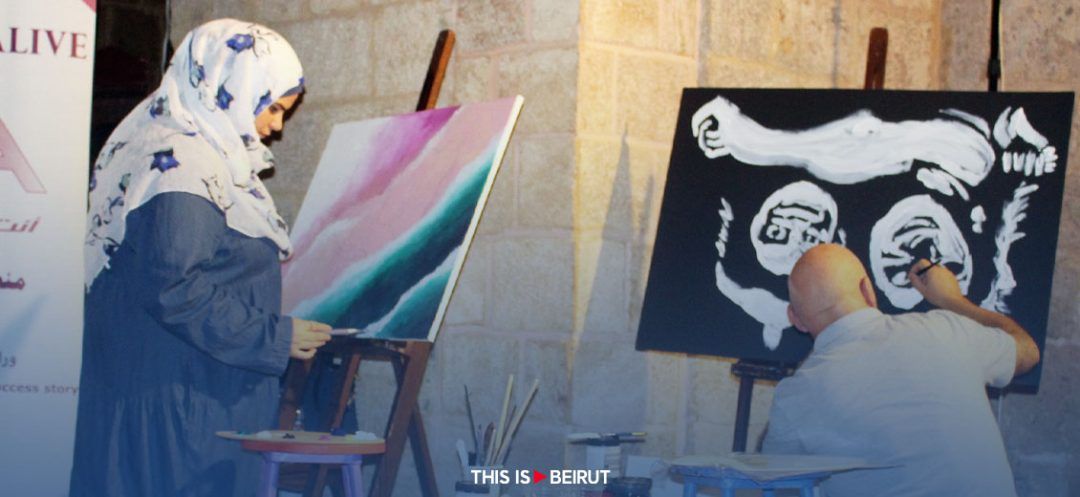
©Artistic activity through which the NGO Women Alive conveys its messages and concepts. Photo DR
In Tripoli, a city ravaged by sectarian divisions and crisis, the NGO Women Alive is leading a vigorous fight for women's rights and empowerment. The goal: to cultivate a cadre of women who would be involved in the peace process and ultimately become the cornerstone of a new social order.
Between a television commercial aired repeatedly on local channels and awareness posters dotting the road from Beirut to Tripoli, it's hard to miss the recent media campaign launched by the NGO Women Alive and sponsored by the Women's Peace and Humanitarian Fund (WPHF). Featuring a striking scenography in which actress Bernadette Houdeib graciously participated, the video highlights the organization's actions but primarily promotes an inclusive model of society in which women are mediators serving security and social reconciliation.
"In the clashes that raged between Tripoli's two rival neighborhoods—Bab al-Tabbaneh and Jabal Mohsen—women clearly demonstrated their leadership and remarkable abilities to work on equal footing with men to consolidate the peace process," emphasizes Ghenwa Schinder, co-founder and director of Women Alive.
This reconciliatory ability was enshrined in 2000 when the 192 United Nations member states unanimously adopted UN Resolution 1325, which guarantees the protection and participation of women in peace agreements. The resolution marked a significant turning point for women, transforming their image in conflict situations from victims to active participants.
Diversity
In the framework of the project aimed at promoting women's participation and engagement in peace recovery and consolidation, the WPHF, in partnership with UN Women Lebanon, has been providing funding to bolster the NGO's impact on the ground for about a year and a half. "The funds allow us to implement programs and events targeting the community as a whole without any distinction of age, gender, nationality or religion. Our beneficiaries come from various socio-cultural and professional backgrounds," Schinder elaborates.
For Carole Melhem, 23, who is one of the beneficiaries of these programs, the NGO does indeed play a unifying role in a highly fragmented city. "The training brings together women from different regions, each with her own experiences, biases and wounds, some scarred by the loss of a son or loved one in sectarian conflicts," she confides. "Despite all the tragedies, they don't give up. They are aware of the significance of their role and actions."
While women and girls make up the majority of participants, men remain influential allies who can help dismantle sexist prejudices to initiate lasting changes in mindset. "They also benefit from the programs, as do the youth—students or high school students—who are the future of our country," the NGO's co-founder underscores.
Empowerment: A Crucial Issue
A long-time activist, Ghenwa Schinder is one of the initiators of the Women Alive project, created in April 2021 to address the urgent situation in the northern regions of the country devastated by financial and health crises. In Tripoli, the situation is dire: gender-based violence is rampant, and women find themselves on the front lines of precariousness. "We quickly realized that the appropriate response would involve advocacy," she explains. "The objective is indeed to promote their economic, social, psychological and political autonomy, make them aware of their rights, and thereby strengthen their role within the community. Today, it is no longer necessary to demonstrate that women's empowerment directly contributes to economic growth."
[gallery link="none" size="large" ids="223241,223244,223243,223242"]
Lobbying
As a pioneer in Tripoli in terms of social and humanitarian engagement for gender equality—with other organizations primarily focused on charity—Women Alive spared no effort from its inception. "Leadership training, working workshops, roundtable discussions, community events, awareness sessions and capacity-building and development sessions form the arsenal of the advocacy process on which we rely," Schinder explains.
Although this empowerment work is crucial, it must be accompanied by sustained networking and lobbying efforts directed at decision-makers and key actors in society. "Lobbying is an integral part of the advocacy strategy," the NGO's director emphasizes. "It enables our studies and research to be published. It also gives us the opportunity to submit our reformative bills in favor of women's and girls' rights and to convince stakeholders to integrate them into future legislation." Because achieving gender equality requires addressing laws. And in an exhausted country where patriarchal traditions die hard, the endeavor is a long-term effort.
Women Soldiers of Peace
In addition to flagship empowerment programs focused on gender-based violence (physical, sexual or socio-economic), the organization provides specialized peace-building modules that introduce volunteers to peaceful conflict resolution practices through mediation. "The goal is to provide women with the necessary tools so they can fully play their role as mediators both in their homes and in various situations in daily life," Schinder explains.
Once they have obtained their certificates, the volunteers undertake the mission of organizing awareness sessions themselves, and, in collaboration with the NGO, community events. In total, 61 women working for gender equality and peace consolidation in Tripoli have been trained, 136 awareness sessions have been conducted through their efforts, and five community events have been co-organized with the NGO, including roundtable discussions, artistic activities or team-building exercises.
"By involving them in the advocacy process, the NGO gives these women the satisfaction of feeling useful and, in turn, this gives them a strengthened position within their community," Schinder emphasizes. Like Carole Melhem, who is now fully engaged in these meetings. "All women and girls should know their basic rights," she insists. "By unlocking their potential, they can become full-fledged decision-makers and make their voices heard in favor of peace and social cohesion."
While the NGO is now making waves, its action also triggers opposition from fundamentalist groups concerned about losing their grip. Nevertheless, these incidents do not dampen Schinder's determination. Like the valiant soldiers of peace she promotes, the activist remains more confident than ever. "I deeply believe that civil society has the power to change entrenched mindsets," she asserts. "Take the example of sexual abuse: the subject was still taboo 15 years ago. It is thanks to the tireless work of civil society that voices could be liberated. We are now addressing the root causes to finally find solutions."
Read more




Comments